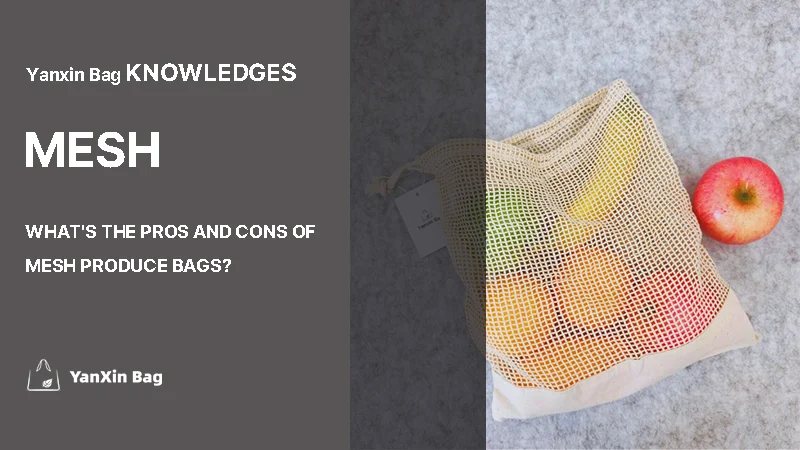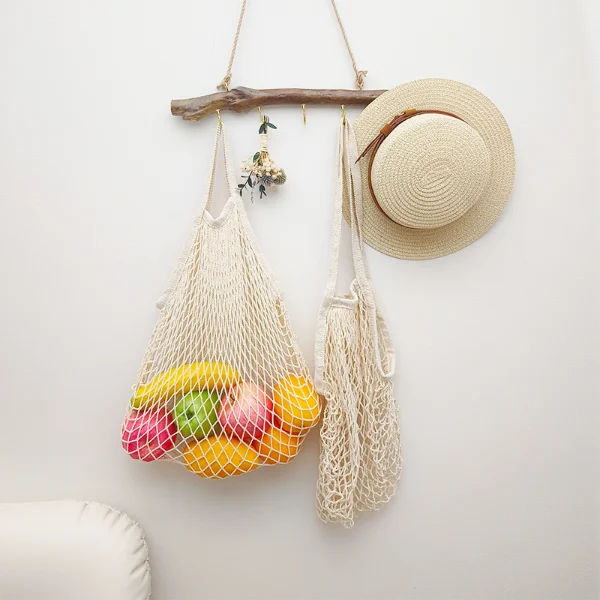
Many people’s first impression of a Mesh Produce Bag is its design — the whole bag covered with tiny holes. This mesh structure is indeed quite different from the fabric bags we usually see. You may have noticed similar nylon mesh bags used in supermarkets for packing apples or onions, but those are mostly disposable and can hardly be reused once torn open. Fabric Mesh Produce Bags, however, are different. They are often made from cotton or polyester fibers, featuring a soft and breathable texture that can be washed and reused many times. Because of this, they have gradually become a popular alternative to plastic bags. Still, while this structure offers many advantages, there are also a few details to keep in mind when using it. Let’s take a closer look at how it actually performs.
A Mesh Produce Bag is an eco-friendly bag characterized by its mesh structure, commonly used for holding vegetables, fruits, or other daily items. Unlike traditional fabric bags made of tightly woven cloth, it is crafted from materials such as cotton, polyester, or nylon, with the entire surface filled with small holes that allow air to circulate freely and prevent dampness or odor buildup. This design makes the bag lightweight and easy to carry or store, while also helping to keep food fresh. In addition to grocery use, many people also use it as a storage or travel bag for toiletries, toys, or clothing. As its applications become increasingly diverse, people have started to pay more attention to its real-life performance and durability.
This is another common question. The mesh structure of a Mesh Produce Bag allows air to circulate freely and reduces moisture buildup, which is beneficial for keeping produce fresh. Fruits and vegetables naturally release ethylene gas as they breathe; when stored in sealed plastic bags, the trapped gas accelerates ripening and spoilage. In contrast, the breathable mesh design allows the gas to disperse naturally, slowing down deterioration. Produce like potatoes, onions, apples, and oranges—which can tolerate drier conditions—are especially suitable for mesh bags. However, leafy greens and berries, which need moisture, can wilt more easily if the environment is too dry. To extend freshness, you can wrap leafy greens in a slightly damp cloth before placing them in the mesh bag, or simply store them in the refrigerator at a low temperature. These small adjustments help the bag work even better.
Some people worry that these mesh bags might be difficult to wash, but with the right method, it’s actually very simple. Polyester and nylon bags can be placed directly into the washing machine and cleaned with a mild detergent, then air-dried naturally. For cotton mesh bags, it’s best to hand wash them in cold water or use a gentle machine cycle to avoid shrinkage or deformation caused by high temperatures. Air drying is recommended—avoid tumble drying. As for cleaning frequency, washing once every two to three uses is ideal. If the bag has held juicy or dirt-covered produce, it’s best to wash it immediately. With minimal care, the bag stays clean, durable, and lasts much longer.
If you’re using a cotton Mesh Produce Bag, there are a few small details to pay attention to when cleaning. Want to know how to wash it without shrinking and make it last longer? You can check out this related article: 《How to Properly Care for a Cotton Mesh Produce Bag》, which includes useful cleaning tips I’ve compiled.
In practice, there are few real problems with Mesh Produce Bags—just some habits to get used to. Sometimes people forget to bring them when going shopping, or need a few extra seconds at checkout to explain they’re using their own bag. Others may feel it’s too breathable, causing leafy greens or herbs to dry out more easily. As for the concern that “the bag might tear easily,” there’s really no need to worry. Cotton and polyester mesh bags are tightly woven and highly durable, and they rarely rip under normal use. After using them, just wash and air-dry them—they’re ready to go again. If you want to keep vegetables fresh for longer, you can pair the mesh bag with a cloth or airtight container. Once you get used to these small details, you’ll find that Mesh Produce Bags are not only sturdy but also easy to integrate into your daily routine.

Mesh produce bags are eco-friendly alternatives to plastic bags. True
Mesh produce bags can be reused many times, significantly reducing single-use plastic waste and environmental pollution.
Mesh produce bags can safely store cooked or wet food. False
They are intended for fresh, dry produce; storing wet or cooked food may cause bacterial growth or odor.
The greatest advantage of Mesh Produce Bags is their ability to effectively reduce the use of single-use plastic bags. Whether made of cotton, polyester, or nylon, these reusable bags help minimize waste generation over time and ease environmental pressure. For consumers pursuing a sustainable lifestyle, this is a practical and easy step to take.
In daily shopping, using Mesh Produce Bags instead of disposable plastic bags can significantly lower plastic consumption. Long-term use not only cuts down carbon emissions from plastic production and incineration but also reduces plastic pollution at the source, making a positive impact on environmental protection.
These mesh bags have excellent breathability that allows air to circulate freely, preventing moisture buildup inside. They also help slow down the release of ethylene gas from fruits and vegetables, delaying ripening. Produce like potatoes, onions, apples, and oranges can stay fresh for longer in this ventilated environment.
Because Mesh Produce Bags help keep fruits and vegetables fresh for a longer time, users can noticeably reduce the frequency of throwing away spoiled food. This not only saves money but also aligns with the modern environmental goal of reducing food waste. For households or retailers that buy produce in bulk, this is a tangible benefit.
Compared with plastic bags, Mesh Produce Bags are made of sturdier materials that can withstand repeated use and washing. Although the initial cost is slightly higher, their long lifespan lowers the average cost over time. For businesses or long-term users, this makes them a more economical investment.
Mesh Produce Bags are not only suitable for holding fruits and vegetables but also useful for home organization, travel packing, or everyday sorting. They can be used to store toys, shoes, toiletries, or light clothing. Lightweight, breathable, and easy to carry, they are practical bags for daily use.
These bags are generally easy to care for and can be either hand-washed or machine-washed. Cotton bags are best washed in cold water and air-dried to prevent shrinkage, while polyester and nylon bags can be machine-washed in warm water and dry quickly. Following the proper cleaning method according to the material will extend their lifespan.
With their transparent and breathable mesh structure, users can easily see what’s inside, making it convenient to separate different types of produce. Root vegetables, fruits, and leafy greens can be stored separately to prevent cross-contamination, keeping the refrigerator or kitchen space neat and organized.
Mesh Produce Bags can feature woven labels or printed logos, turning them into functional and promotional gifts. Many companies use them as eco-friendly event giveaways or retail packaging to enhance brand image while promoting sustainability, giving them strong marketing value.
Overall, the advantages of Mesh Produce Bags are clear. They effectively reduce plastic use, extend produce freshness, and offer versatile value in daily life. When used and maintained properly, these bags not only improve convenience but also make a meaningful contribution to environmental protection—serving as an ideal balance between practicality and sustainability.

Cotton mesh produce bags are biodegradable. True
Cotton is a natural fiber that can decompose under proper environmental conditions, making cotton mesh bags biodegradable.
All types of produce stay fresh longer in mesh bags. False
Leafy greens and herbs can dry out too quickly in mesh bags, as they need a more humid environment.
Because of their mesh structure, small items such as rice, beans, or sesame seeds can easily slip through the openings, making them inconvenient to store. It’s best to keep these types of food in sealed jars or airtight containers to prevent spillage and mixing.
The main feature of a Mesh Produce Bag is its breathability—but that also means it cannot effectively retain moisture. High-water-content vegetables like cucumbers and carrots may lose water and become soft when kept in a dry environment. These types of produce are better stored with a cloth bag or in an airtight container for optimal freshness.
Not every fruit or vegetable is ideal for Mesh Produce Bags. Leafy greens like spinach, lettuce, and cilantro require a certain level of humidity, and they can wilt quickly in a highly breathable environment. For these items, slightly damp cloth bags or sealed containers are better storage options.
While Mesh Produce Bags are reusable, their initial purchase cost is higher than that of free or inexpensive plastic bags commonly provided in supermarkets. For new users, it may take time to recognize the long-term cost advantage that comes with repeated use.
Since Mesh Produce Bags often come into direct contact with fresh produce, they can easily retain juices, dirt, or odors if not cleaned promptly. Although cleaning is not difficult, it’s important to maintain a consistent cleaning routine and use proper washing methods to keep the bags hygienic and durable.
While Mesh Produce Bags are generally sturdy, fine cotton mesh or small-hole polyester bags have limited weight capacity. When used to carry heavy produce like multiple potatoes or pumpkins, the bag may stretch or lose shape. It’s recommended to choose the appropriate size and thickness based on your intended use.

Overall, Mesh Produce Bags do have certain limitations, but most of them can be easily addressed with proper usage. By choosing the right storage method for different types of produce and maintaining good cleaning habits, these bags can still serve as a practical and eco-friendly choice that balances convenience with sustainability.
Using mesh produce bags can help reduce food waste. True
By keeping produce fresh for longer, mesh bags reduce the amount of spoiled fruits and vegetables that end up being discarded.
Mesh produce bags eliminate the need for regular cleaning. False
Because they come in contact with fresh produce, they must be cleaned regularly to maintain hygiene.
To provide a clearer understanding of how Mesh Produce Bags perform overall, the table below summarizes their key pros and cons. From sustainability and practicality to everyday usability, this comparison helps readers quickly assess their real-world value.
| Advantages | Disadvantages |
|---|---|
| Reduces single-use plastic waste | Not suitable for storing very small items |
| Helps reduce plastic pollution | Limited moisture retention |
| Breathable structure helps extend freshness | Cotton bags may shrink or deform |
| Helps minimize food waste | Not suitable for all types of produce |
| Durable and cost-effective in the long run | Higher initial cost than disposable bags |
| Versatile and widely applicable | Requires regular cleaning and maintenance |
| Easy to clean and maintain | Limited weight capacity |
| Convenient for sorting and storage | |
| Customizable for branding and promotion |
Different materials used for Mesh Produce Bags offer distinct characteristics in terms of user experience and environmental performance. The three most common options—cotton, polyester, and nylon—each have unique strengths and limitations in texture, durability, and sustainability.
Made from natural fibers, cotton mesh bags are soft to the touch, breathable, and biodegradable under proper conditions. They have a natural, organic feel that appeals to users who value sustainability. However, cotton mesh bags can shrink when washed and take longer to dry, so proper care is important for long-term use.
As a synthetic fiber, polyester offers excellent stability, light weight, and durability. It resists mold, is easy to wash, and comes at an affordable price—making it one of the most common choices for daily shopping and home use. The downside is that polyester is not biodegradable; while its longevity supports reusability, it is less environmentally friendly than natural materials.
If you prioritize natural materials and biodegradability, cotton is the best fit. For affordability and long-term durability, polyester is the most practical choice. And if you want a balance of strength and flexibility, nylon offers the best middle ground. Each material has its advantages—what matters most is matching the bag type to your specific needs and usage scenario.


Mesh produce bags are suitable for carrying other items like toys or laundry. True
Their lightweight, breathable design makes them versatile for organizing travel accessories, toys, and laundry.
Mesh produce bags are suitable for storing grains, beans, or seeds. False
The holes in the mesh structure allow small items like grains or beans to fall through, making them unsuitable for such use.
A Mesh Produce Bag is a sustainable alternative to plastic bags, but it’s not without limitations. It performs remarkably well in reducing plastic use, keeping produce fresher for longer, and improving storage efficiency. However, it does have some constraints, such as limited moisture retention and the need for regular cleaning. To make the most of it, users should understand its features and choose suitable materials and usage methods based on different purposes. For individuals, it represents a simple yet effective step toward a sustainable lifestyle; for brands and businesses, it’s a practical way to communicate both environmental responsibility and brand values.
If you’re looking for a product that balances eco-conscious design with everyday practicality, Yanxin Bag offers a variety of custom Mesh Produce Bag solutions. We can tailor materials (such as cotton or polyester), bag structures, and mesh patterns to align with your brand positioning. A range of printing and labeling options is also available to ensure each bag is both functional and brand-representative. Whether for retail packaging, fresh produce sales, or corporate sustainability campaigns, we can help you create durable, visually appealing, and eco-friendly bags that embody your brand’s commitment to sustainability. Contact us today to discuss a customized packaging solution that fits your brand’s needs.
Want a solid foundation before choosing your produce bag?
This article starts by defining reusable produce bags and exploring their background and practical value. It highlights their multiple benefits, introduces a wide range of typical styles, and ends with a comprehensive guide to customization—covering materials, styles, printing, sizing, and care.
Still comparing mesh bags with plastic ones?
This article begins by explaining the core traits of mesh produce bags, then compares them with plastic bags across multiple practical and experiential factors. It provides a clear summary of pros and cons to help readers understand which bag fits better in different scenarios.
Want your cotton mesh bags to stay clean and last longer?
This article explains why proper maintenance is essential for cotton mesh bags, outlining how often to clean, how to choose between hand-washing and machine-washing, how to dry them properly, and how to store them to avoid contamination.
Looking for a smart way to store herbs with mesh bags?
This article examines the storage needs of fresh herbs and shows why mesh produce bags work well. It provides clear steps for preparation and storage, along with key tips to maintain freshness longer and avoid common mistakes.
Curious about what goes into a mesh bag?
This article introduces the common mesh fabrics used in produce bags, describing their weave types, texture, environmental attributes, and typical applications—helping you understand the strengths of each material.
Get a free quote and expert consultation today. Let's bring your brand vision to life.
1 Discover the advantages of Mesh Produce Bags and how they contribute to reducing plastic waste.
2 Learn about the benefits of hand washing in cold water to prevent damage and maintain the quality of your items.
3 Explore this link to understand why Nylon is favored for its flexibility and strength in various applications.
Answer: Mesh produce bags are typically made of cotton, polyester, or nylon. These materials are lightweight, breathable, and durable, making them ideal for storing fruits, vegetables, and other reusable shopping needs.
Answer: Yes, mesh produce bags are eco-friendly because they can be reused multiple times, reducing the use of single-use plastic bags and lowering plastic pollution.
Answer: Yes, the breathable mesh design allows air circulation, which reduces moisture buildup and ethylene gas accumulation, helping produce like apples, onions, and potatoes stay fresh for longer periods.
Answer: Yes, cotton mesh bags are made from natural fibers that can decompose under proper conditions, making them biodegradable and sustainable compared to synthetic materials.
Answer: Yes, most mesh produce bags are machine washable. For cotton mesh bags, use cold water and air-dry them to prevent shrinkage. Polyester or nylon mesh bags can be washed on a gentle cycle and dry quickly.
Answer: Partly. Polyester mesh bags are not biodegradable but are highly durable, meaning they can be reused many times, which still helps reduce plastic waste overall.
Answer: Foods with high moisture content like leafy greens, herbs, and berries should not be stored in mesh produce bags, as they can dry out quickly due to the high breathability.
Answer: Yes, their breathable design allows air to circulate and moisture to escape, which helps prevent mold buildup and keeps produce dry and fresh.
Answer: Cotton mesh bags are natural and biodegradable but may shrink when washed; polyester is durable and affordable but non-biodegradable; nylon is lightweight and strong but less resistant to high temperatures.
Answer: Yes, mesh produce bags are reusable, breathable, and sustainable. Unlike plastic bags that trap moisture and contribute to pollution, mesh bags reduce waste and help produce last longer.

Order or no-order we are Always here to help you!
We will contact you within 1 working day, please pay attention to the email with the suffix “@yanxinbag.com”.
Order or no-order we are Always here to help you!
We will contact you within 1 working day, please pay attention to the email with the suffix “@yanxinbag.com”.